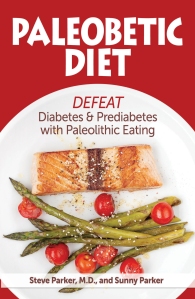No, insulin probably isn’t the cause of constant hunger, according to Dr. Stephan Guyenet. Dr. G gives 11 points of evidence in support of his conclusion. Read them for yourself. Here are a few:
- multiple brain-based mechanisms (including non-insulin hormones and neurotransmitters) probably have more influence on hunger than do the pure effect of insulin
- weight loss reduces insulin levels, yet it gets harder to lose excess weight the more you lose
- at least one clinical study (in 1996) in young healthy people found that foods with higher insulin responses were linked to greater satiety, not greater hunger
- billions of people around the world eat high-carb diets yet remain thin
An oft-cited explanation for the success of low-carbohydrate diets involves insulin, specifically the lower insulin levels and reduced insulin resistance seen in low-carb dieters. They often report less trouble with hunger than other dieters.
Here’s the theory. When we eat carbohydrates, the pancreas releases insulin into the bloodstream to keep blood sugar levels from rising too high as we digest the carbohydrates. Insulin drives the bloodstream sugar (glucose) into cells to be used as energy or stored as fat or glycogen. High doses of refined sugars and starches over-stimulate the production of insulin, so blood sugar falls too much, over-shootinging the mark, leading to hypoglycemia, an undeniably strong appetite stimulant. So you go back for more carbohydrate to relieve the hunger induced by low blood sugar. That leads to overeating and weight gain.
Read Dr. Guyenet’s post for reasons why he thinks this explanation of constant or recurring bothersome hunger is wrong or too simplistic. I tend to agree with him on this.
The insulin-hypoglycemia-hunger theory may indeed be at play in a few folks. Twenty ears ago, it was popular to call this “reactive hypoglycemia.” For unclear reasons, I don’t see it that often now. It was always hard to document that hypoglycemia unless it appeared on a glucose tolerance test.
Regardless of the underlying explanation, low-carb diets undoubtedly are very effective in many folks. That’s why I offer one as an option in my Advanced Mediterranean Diet. And low-carbing is what I always recommend to my patients with carbohydrate intolerance: diabetics and prediabetics.






